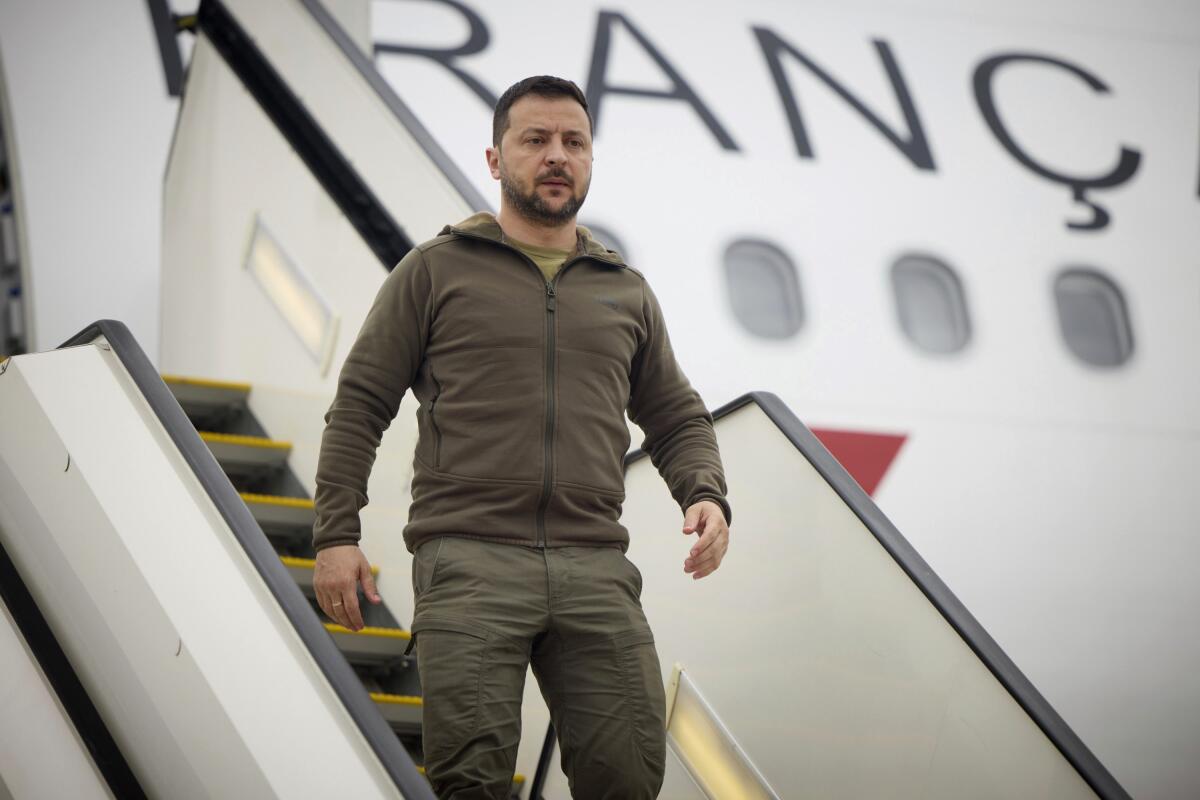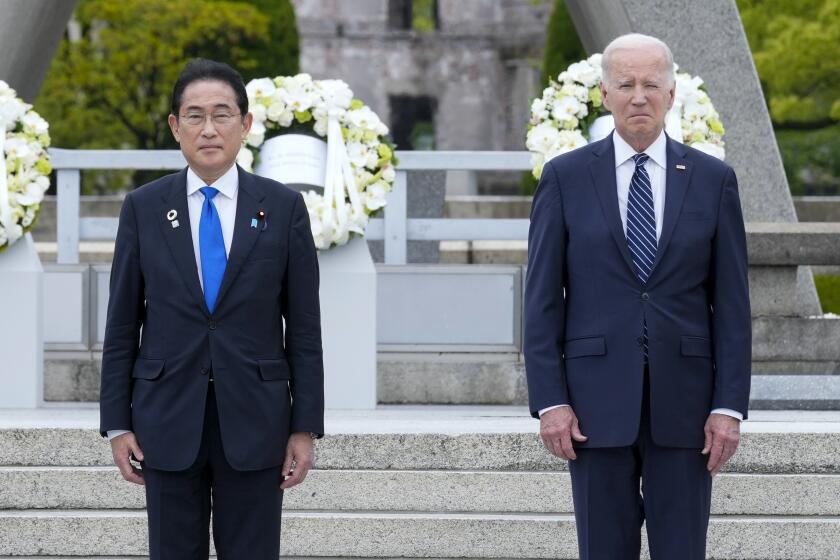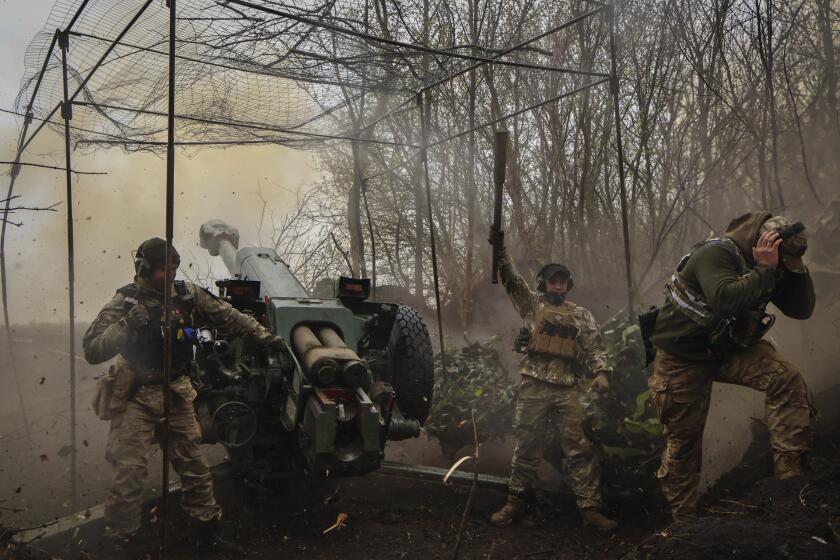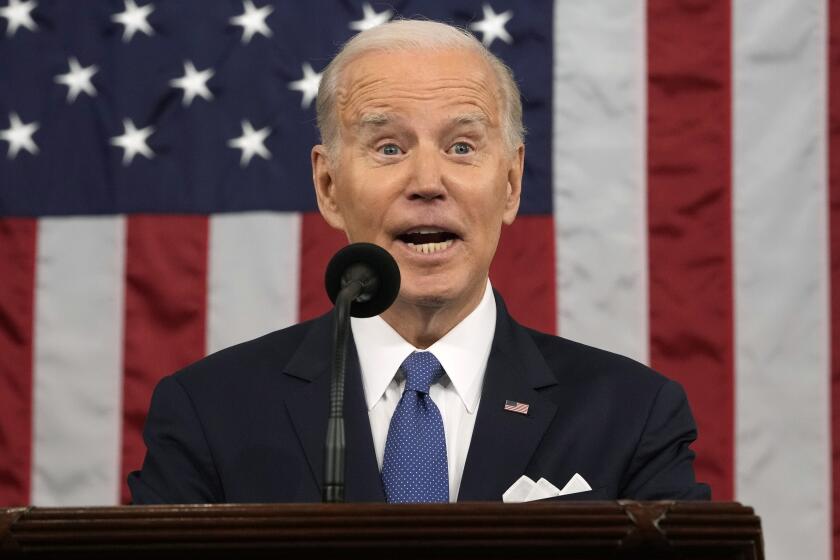Biden wraps up G-7 summit with more aid for Ukraine, confusion on Bakhmut, optimism on China

- Share via
HIROSHIMA, Japan — Wrapping up a summit of the world’s wealthiest democracies here Sunday, President Biden had domestic trouble on his mind — the flagging U.S. debt talks — but also addressed the administration’s most pressing international concerns: Ukraine and China.
Biden announced another package of military aid for Ukraine, including $375 million in armored combat vehicles and artillery. And he predicted U.S.-China relations, at one of their lowest points in decades, will soon improve.
The Group of 7 nations used their annual gathering to condemn Russia’s invasion of Ukraine nearly 15 months ago, reiterate their solid support for Kyiv and implore China to be more constructive in ending the war and in reining in its own aggressive actions toward Taiwan.
“Together with the entire G-7, we have Ukraine’s back and we’re not going anywhere,” Biden said.
Ukraine’s President Volodymyr Zelensky made a splashy appearance at the summit Sunday, part of a global campaign to plead for more support for his beleaguered nation’s battle to eject Russian troops. Biden and Zelensky greeted each other with an embrace.
Earlier Sunday, Russian President Vladimir Putin congratulated his troops and mercenaries from the Wagner Group for what he claimed was the conquest of Bakhmut, site of the longest and bloodiest battle of the war.
Group of 7 leaders convene in Hiroshima and honor victims of the U.S. atomic bomb. But they have no new plans to reduce the threat of nuclear war.
Zelensky initially seemed to lament the annihilation of the small eastern city and its fall to occupation forces, saying, “Bakhmut is now only in our hearts.”
Later, as his aides attempted to walk back the comments, Zelensky clarified to reporters that the contested city “is not occupied by the Russian Federation as of today.”
It was impossible to determine the complete reality on the ground, but Russia has had the upper hand for some time. Both sides have taken massive casualties in the fighting.
“People are the treasure,” Zelensky said. “I cannot share with you the technical details of what is happening with our warriors.”
The more meaningful gauge of success for Ukrainian forces has been their ability to keep the Russians bogged down in the prolonged battle for Bakhmut.
Biden also said he would permit Ukrainian pilots to train on U.S.-made F-16 fighter jets, equipment that the U.S. government has yet to supply to the Ukrainians to avoid the appearance of further escalation in the war. Biden said he had received “flat assurance” that Ukraine will not use any American-made equipment, including F-16s, to attack within Russia. Russian forces inside Ukraine — including presumably the Crimea peninsula that Russia occupied in 2014 — are fair game, Biden said.
Turning to China, Biden reiterated his intention to “make sure Taiwan can defend itself” in case of a unilateral attack from Beijing. But he also said he envisioned an improvement in relations between Washington and the government of President Xi Jinping.
“I think you’re gong to see that begin to thaw very shortly,” Biden said in a news conference. He voiced again support for the “One China” policy, a deliberately ambiguous relationship that recognized mainland China officially while acknowledging Taiwan as a self-ruled island.
Biden’s words may have been aimed at toning down stern language in a communique issued by the G-7 a day earlier that scolded China and angered Xi’s government, which said the democracies were interfering in China’s domestic affairs.
Start your day right
Sign up for Essential California for the L.A. Times biggest news, features and recommendations in your inbox six days a week.
You may occasionally receive promotional content from the Los Angeles Times.
During the three-day summit in the Japanese city that was obliterated by a U.S. atomic bomb during World War II, killing 140,000 people, Biden observed an evolving bit of diplomatic rapprochement between traditional rivals South Korea and Japan.
Enmity has persisted between the two over Japanese treatment of Koreans during Japanese colonial rule and the war. But South Korean President Yoon Suk-yeol and Japanese Prime Minister Fumio Kishida have taken steps towards reconciliation, and Biden invited both to a rare trilateral meeting in Washington at a date to be determined. Both men accepted, a senior administration official said.
After pledging the danger of a U.S. default on its debt would not overshadow the summit, Biden returned to the topic again Sunday.
He said he believed he had authority under the 14th Amendment of the U.S. Constitution to unilaterally guarantee that debt payments are made, although he acknowledged there would likely be legal challenges to such an effort.
Some legal scholars say a clause in the 14th Amendment could mean the president can bypass Congress and clear the way for more debt to be issued. Others are dubious.
Although unable to predict what House Republicans will do, he said he would be in telephone conversations with Speaker Kevin McCarthy later Sunday from aboard Air Force One on his return home.
Later in Washington, McCarthy (R-Bakersfield) said on Capitol Hill that the two men had a “productive” call and would meet in person on Monday.
Subramanian reported from Hiroshima and Wilkinson from Washington.
More to Read
Get the L.A. Times Politics newsletter
Deeply reported insights into legislation, politics and policy from Sacramento, Washington and beyond. In your inbox three times per week.
You may occasionally receive promotional content from the Los Angeles Times.















